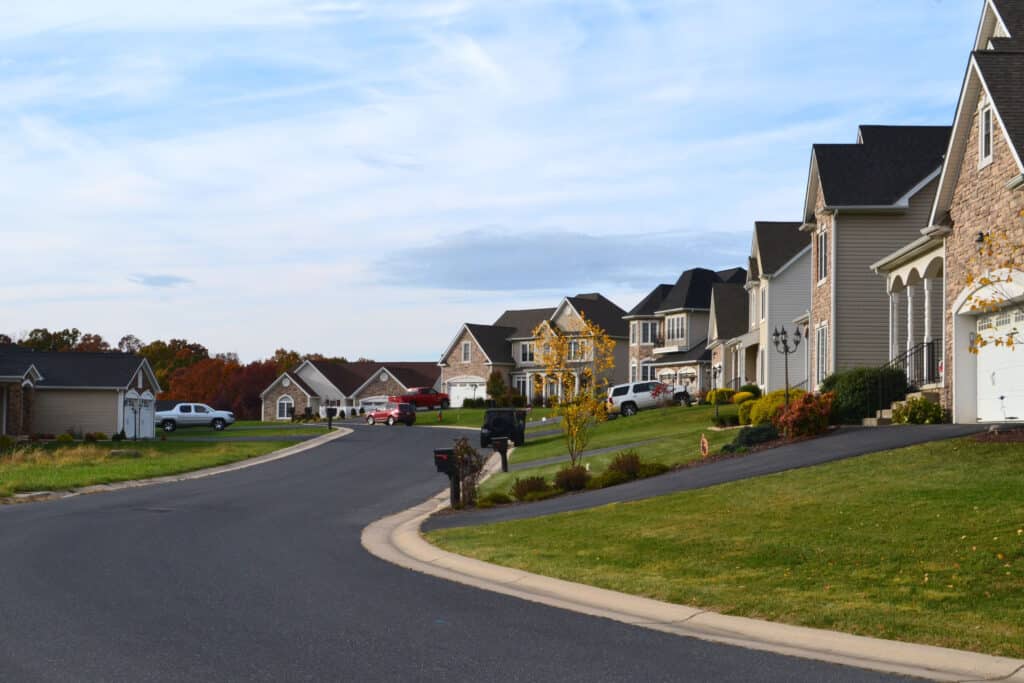Navigating the complexities of Homeowners’ Associations (HOAs) can be daunting for prospective homebuyers, whether they’re purchasing their first home or transitioning to a community-regulated property. Understanding HOA rules and regulations is crucial in making an informed decision about where to live and build your future. This guide aims to demystify common HOA standards, from landscaping and pet restrictions to parking and paint choices, while highlighting the advantages of community living under an HOA’s governance.
For those considering homes in Southern Indiana and Eastern Illinois, local insights into HOA norms and their impact on home designs are particularly valuable. Reinbrecht Homes plays a pivotal role in this process, helping homeowners align their dream home visions within the set frameworks of community rules. By the end of this article, you’ll not only grasp the essentials of HOA compliance but also understand how to leverage these regulations to enhance your living experience and property value.
Understanding HOA Rules and Regulations
Homeowners’ Associations (HOAs) are organizational bodies that govern certain neighborhoods or condominiums, primarily enforcing rules and regulations aimed to maintain property values and the aesthetic quality of the community. Joining an HOA requires homeowners to adhere to a set of established norms that cover everything from landscaping and house color to parking and pet restrictions. While these rules might seem restrictive, they are designed to ensure a uniform and appealing environment for all residents.
Common rules enacted by HOAs include maintaining well-kept lawns, specific guidelines on the types of fences and exterior paint colors allowed, and regulations about parking and the number or types of pets you can have. These rules vary significantly from one association to another but are always aimed at sustaining an orderly community appearance and functioning.
Benefits of Living in an HOA-Governed Community
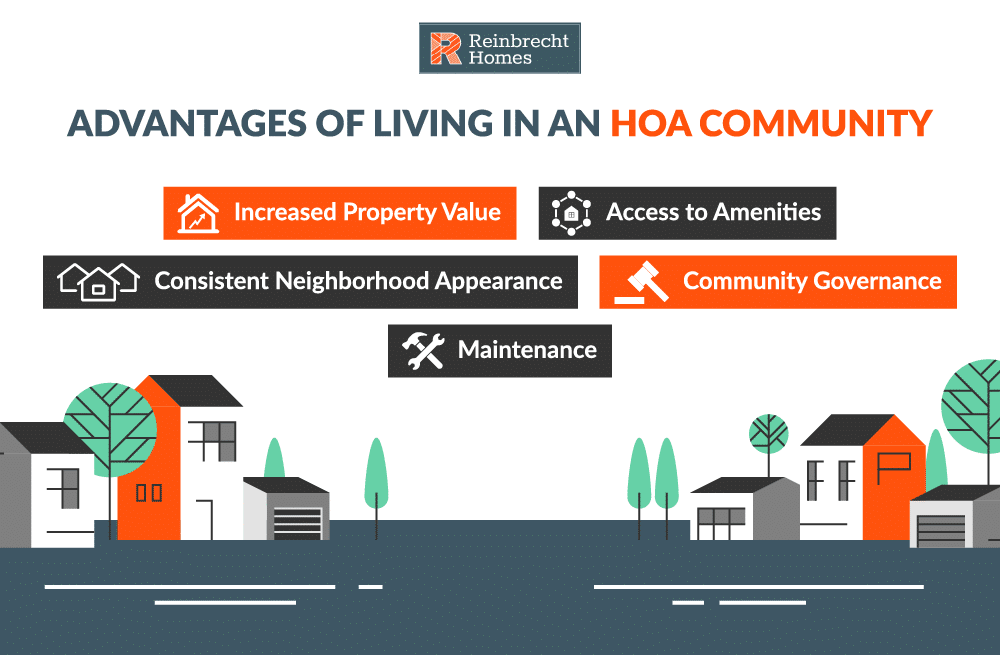
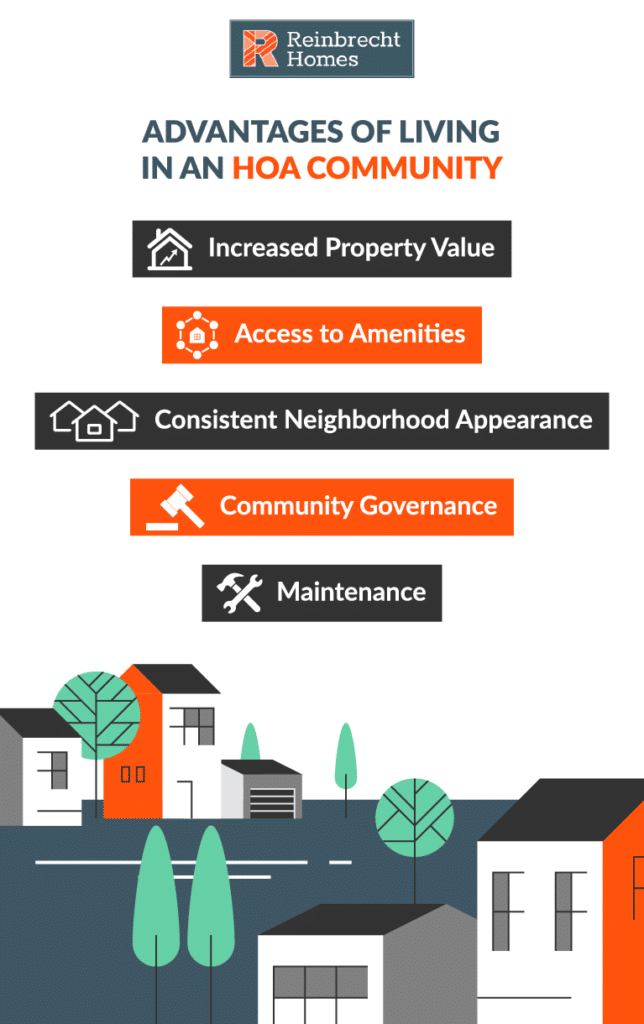
Living in an HOA-governed community has numerous benefits that make it an attractive option for many homeowners. Some of the most notable advantages include:
Increased Property Values
One of the primary advantages of living in an HOA-governed community is the potential for increased property values. Consistent maintenance and aesthetic standards upheld by HOA regulations help ensure that all properties adhere to a certain quality level, making the entire neighborhood more appealing and elevating property values. This is especially beneficial in markets like Southern Indiana, where curb appeal significantly influences home market prices.
Community Amenities and Services
HOAs often provide access to a range of community amenities that might be unaffordable or impractical for an individual homeowner to manage. These include recreational facilities such as swimming pools, fitness centers, and community spaces suitable for events and gatherings. Moreover, HOA fees typically cover essential services like trash removal, water, and security, contributing to a hassle-free living environment conducive to both singles and families.
Neighborhood Aesthetics and Uniformity
Living in an HOA community also means enjoying a high standard of neighborhood aesthetics. Strict rules about landscaping, house colors, and exterior maintenance ensure that each property is not only up to par but also harmonizes with the surrounding environment. This uniformity helps create an attractive, orderly appearance that many homebuyers find appealing. It’s an essential consideration in regions like Southern Indiana, where community appearance plays a crucial role in homebuying decisions.
Community Governance and Maintenance
HOAs are responsible for community governance and maintenance. This can range from enforcing rules and regulations to maintaining common areas and amenities. This proactive approach can save homeowners time and money, as well as ensuring a consistently high standard of living within the community. This can also help foster a sense of community and camaraderie among residents, creating a more enjoyable living experience.
How to Comply With HOA Guidelines
Navigating the rules and regulations set forth by a Homeowners’ Association (HOA) begins even before purchasing a property. It is crucial for prospective homeowners to thoroughly review the HOA’s guidelines to ensure they fully understand what is expected of them. This initial step lays a firm foundation for complying with the rules and avoiding any potential pitfalls down the line.
When homeowners decide to live in an HOA-governed community, staying updated on rule changes is paramount. Regularly attending community meetings and reading monthly or quarterly newsletters provided by the HOA can keep homeowners informed of any amendments or important notices. Keeping an open line of communication with the HOA board is also beneficial. This proactive approach not only helps in understanding the current regulations but also enables homeowners to voice their concerns or suggestions in community governance.
Another effective strategy is maintaining a positive relationship with the HOA board and other residents. In cases where discrepancies or misunderstandings regarding the guidelines arise, having a respectful and open dialogue can facilitate a quicker and more amicable resolution. These tips ensure homeowners remain compliant with HOA rules, contributing to a harmonious community environment.
Common Pitfalls and How to Navigate Them
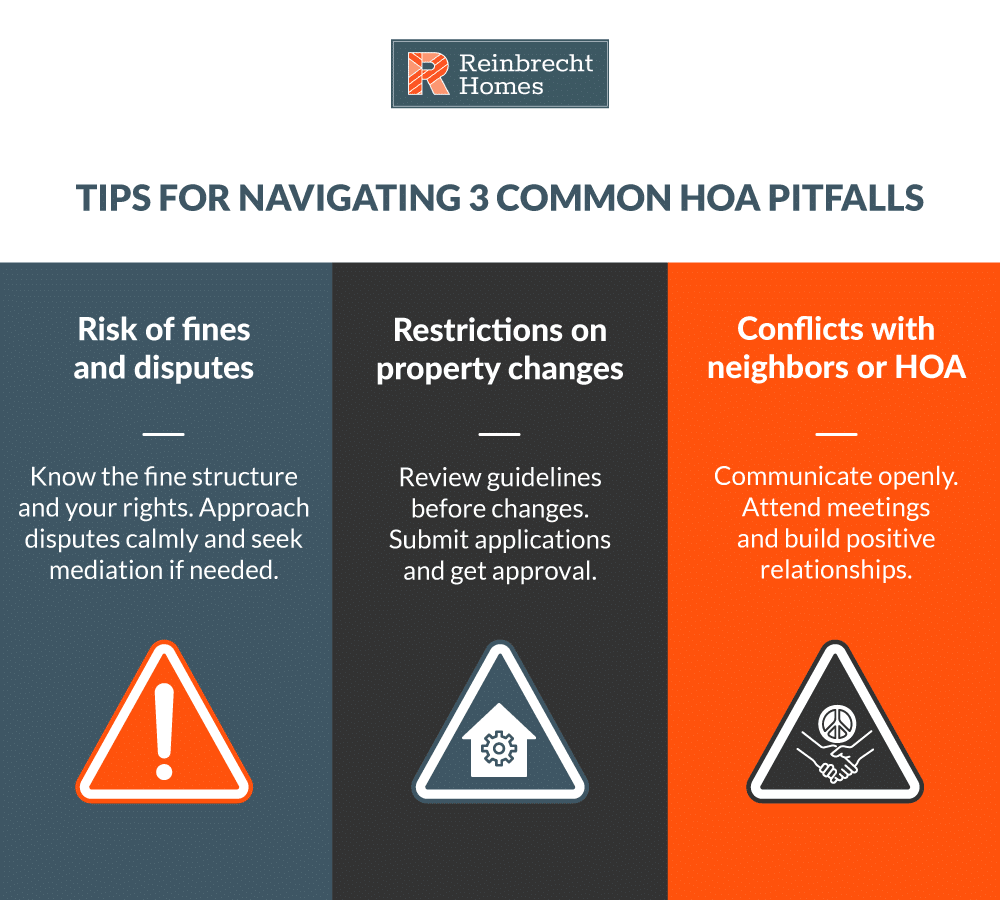
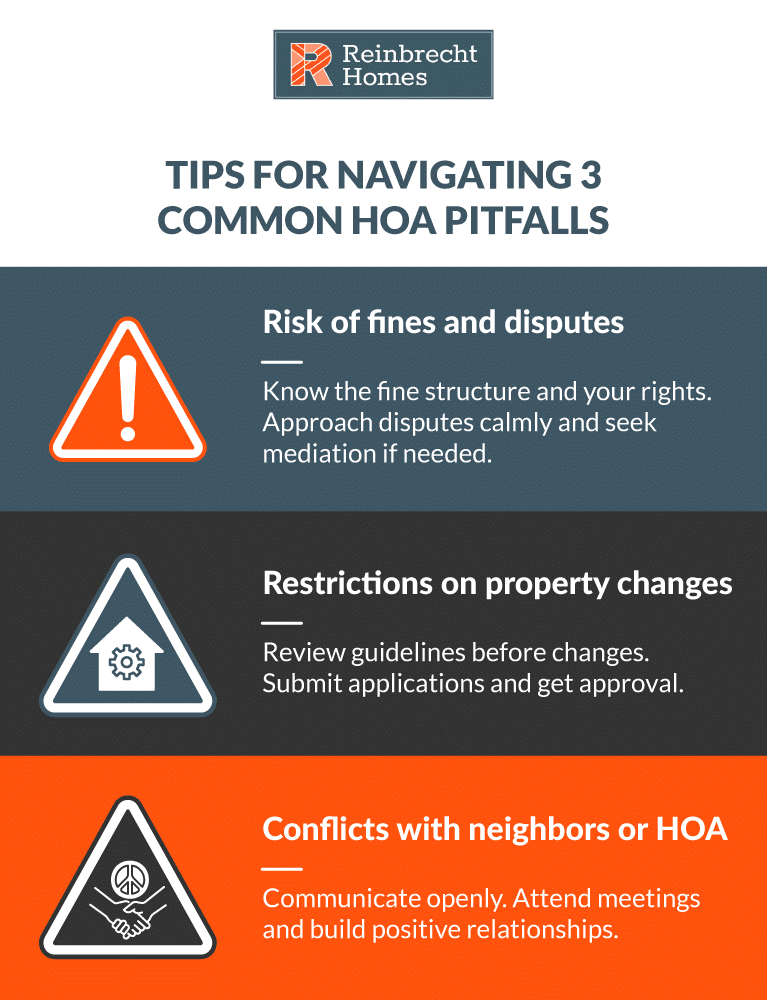
While living in an HOA community has many benefits, there are also potential pitfalls that homeowners should be aware of to navigate them successfully.
Dealing with Fines and Disputes
Homeowners associations are notorious for their strict enforcement of community rules, which can lead to fines or disputes between homeowners and the HOA. Understanding the fine structure and common violations can help homeowners avoid unexpected penalties. It is essential to read the fine print in your HOA agreement and know your rights. If a dispute does arise, approach the situation calmly and constructively, seeking mediation if necessary to find a fair resolution.
Understanding the Limitations on Property Changes
Many HOA-governed communities have strict guidelines on external property changes to maintain a uniform neighborhood aesthetic. This can include restrictions on paint colors, types of fencing, and landscaping choices. Before planning any home improvements or renovations, review your HOA’s architectural guidelines thoroughly. Submit any required applications for property changes and wait for approval before proceeding to ensure that all modifications are compliant with HOA standards.
Resolving Conflicts Amicably with Neighbors and HOA Management
Living in close proximity to others can sometimes lead to conflicts, whether it’s over noise complaints, pet behavior, or property boundaries. To handle these situations amicably, maintain open and respectful communication with your neighbors and HOA board. Attend community meetings regularly to express your concerns and stay informed about any issues that could affect you. Keeping a positive relationship with your neighbors and the board not only helps in resolving minor disputes but also builds a supportive community atmosphere.
Role of Reinbrecht Homes in Facilitating Compliance with HOA Rules
Reinbrecht Homes plays a pivotal role in ensuring that new homeowners comply with all relevant HOA regulations during the home construction phase. Understanding the local HOA rules can often be complex, and Reinbrecht Homes provides expert guidance to navigate this process smoothly. They stay updated on all HOA requirements and coordinate closely with HOA boards to ensure that all plans are approved before construction begins. This preemptive approach helps in avoiding delays and potential legal issues.
Reinbrecht Homes also helps homeowners understand the long-term implications of HOA rules on their lifestyle and property investment. They provide expert advice on home design elements that comply with HOA standards while still reflecting the homeowner’s personal style. This approach helps ensure a seamless home building experience that aligns with HOA rules and ultimately leads to a harmonious living experience within the community.
Considerations for Prospective Homebuyers in HOA Communities
When exploring properties in HOA communities, prospective homebuyers need to focus on three crucial areas: assessing HOA fees, understanding long-term implications of HOA rules on their lifestyle, and seriously considering certain key questions before finalizing their decisions.
Assessing HOA Fees and What They Cover
Firstly, it’s imperative to understand HOA fees and what these funds are utilized for. HOA fees can differ widely and are used to maintain common areas such as pools, parks, and community gyms, and may also include services like trash removal and road maintenance. Reviewing the fee structure will help buyers estimate monthly expenses and determine if the benefits justify the costs.
Understanding the Long-Term Implications of HOA Rules on Lifestyle and Home Investment
HOA rules can significantly affect everyday life and the potential resale value of a home. Restrictions or allowances regarding home color, landscaping, and renovations’ scope might enhance property values but could also limit personal expression and physical updates on the property itself. It’s vital that homebuyers contemplate how these rules might mesh with their lifestyle expectations and future plans. For example, families planning to expand might find renovation rules restrictive.
Key Questions to Ask When Evaluating Homes in a New Neighborhood
Lastly, homebuyers are advised to ask detailed questions during the evaluation process:
- What specific restrictions do the HOA rules impose on renovations and additions?
- How often are the HOA fees assessed, and how often have they increased in the past?
- Are there any ongoing or upcoming special assessments?
- How does the HOA handle conflicts and rule enforcement?
Probing these aspects will provide a clearer picture of what it means to live in such communities and help homebuyers make informed decisions, aligning with both their immediate needs and future aspirations.
Simplifying Your Home Buying Experience in HOA-Governed Communities
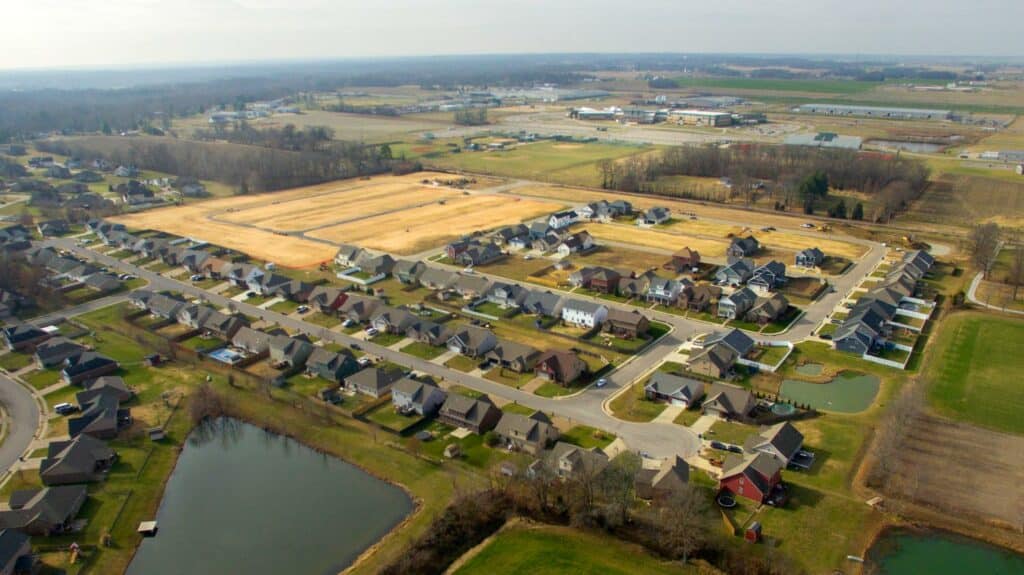
Navigating the complexities of HOA rules and regulations can significantly influence your home buying and building experience. Armed with the right information and strategic support, you can make the most of living in an HOA-governed community while avoiding common pitfalls. Reinbrecht Homes offers expert guidance and tailored solutions, ensuring that your new home not only meets your personal preferences but also complies seamlessly with HOA standards.
If you’re planning to build or buy in Southern Indiana or Eastern Illinois, let us help you seamlessly integrate into your new HOA community. We invite you to explore our range of customizable floor plans and homes that align with HOA regulations, all designed with quality and energy efficiency in mind. Reach out to Reinbrecht Homes today, and let’s turn your dream home into a reality within a harmonious community setting.

